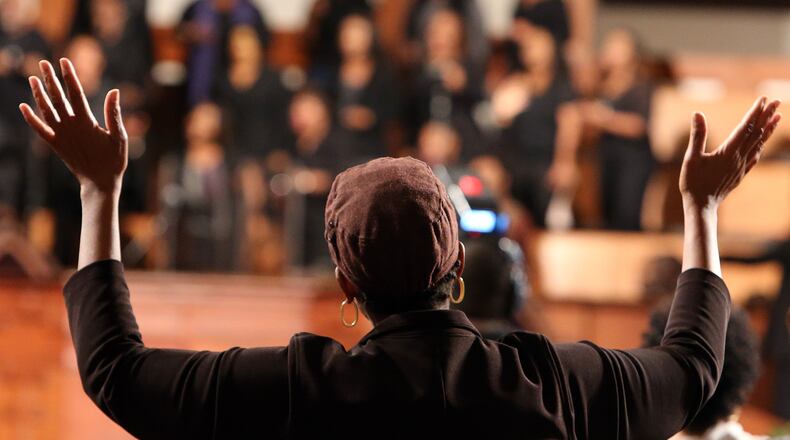Ebenezer Baptist Church had a revival electricity, applause line following applause line, until the Rev. Frank Cornelius Brown, president of the Concerned Black Clergy, dropped a kernel of unwelcome truth into the proceedings.
“Not only should we be angry with what happened in Ferguson, we must be angry when we experience black-on-black crime,” he said, to swelling applause that was quickly replaced by a growing chorus of boos.
“We must make sure we stand up in all situations, to make sure we make positive change in our community,” Brown continued. “We must make sure we value ourselves and that we value life.”
It was not what some in the crowd were primed to hear at Monday's event, called The Community Speaks and convened in response to the Ferguson troubles. Folks had gathered to welcome Eric Holder, America's first black attorney general, with rousing cheers and regale him with their grievances against heavy-handed policing.
Brown had already made the requisite denunciations of police brutality and an endemic double standard in the legal system. But he didn’t leave it at that.
I can understand why his reference to the stats — which show that blacks are largely responsible for the higher homicide rate in black communities — was as welcome as a skunk spraying the congregation. It’s a point conservatives often whip out when the conversation comes to cops killing black suspects at a much higher rate than white suspects.
Latest and most famous was former New York City Mayor Rudy Giuliani, who on “Meet the Press” recently noted that Ferguson officer Darren Wilson’s killing of Michael Brown was an anomaly.
“Ninety-three percent of blacks are killed by other blacks,” Giuliani said on the show. “We’re talking about the exception here.
“What about the poor black child that is killed by the other black child? Why aren’t you protesting that?”
It’s a question dredged up frequently with variations: “Why isn’t Jesse Jackson protesting that?” or “Why isn’t Al Sharpton making a fuss about that?”
In fact, black leaders have been vocal about gun violence in their community. In 1991, almost 40 black Americans out of 100,000 were homicide victims. In 2008, it was half that — fewer than 20 per 100,000. Still, the rate was six times higher than that for whites, according to a 2011 Justice Department study.
Giuliani’s statement was true and taken from that 2011 report. It found that 93 percent of blacks killed in the U.S. between 1980 and 2008 were indeed killed by people who looked like them. But the same report said that 84 percent of white homicide victims were killed by whites.
People are generally killed by people they know or hang around. And since Americans still largely self-segregate, they’re more apt to kill their own, even if the perpetrator and victim are strangers.
I called Brown Tuesday, and he was not surprised by the mixed reaction to his statements.
“People of color are angry and frustrated, because when (incidents like the one in Ferguson) take place, justice does not happen,” he said. “Folks want to focus on the sensitivity and emotion of what happened there. But we not only have to hold law enforcement and police accountable, we also have to hold ourselves accountable.
“We have to determine what are we doing wrong, that we find our young people at the point of a gun,” he said. “It’s a tough conversation to have. A lot of it has to do with our history as a people.”
Brown’s comments mirrored those of the Rev. Francys Johnson, president of Georgia’s NAACP chapter, who released a statement Monday saying: “Let’s use this moment to have a larger conversation about what kind of future we want for our sons and daughters. The truth is since the unjust Grand Jury announcement, nearly 100 African Americans have senselessly died to violence within our communities. Indeed, the No. 1 cause of death for young black men ages 15 to 34 is murder. Who’s committing the murder? Not police. Other Black men.
“We need to talk about the militarization of our civilian police; the appropriate use of force; the deep chasms of mistrust between the police and those they serve and protect. Yet we need to talk about our communities proximity to violence as producers, consumers, and purveyors of it.”
I called Johnson and he said there is a defensiveness when talking about race.
He said Giuliani was roundly criticized for his statements (he was also roundly supported) because as New York mayor he instituted the “stop and frisk” policy of hard-nosed policing that overwhelming targeted blacks.
Johnson said Giuliani’s concern for black victims “rings hollow” because stop and frisk “created an impression that black males are dangerous.”
The 35-year-old father of three, who is also a lawyer, said he brought up the issue “because it’s a crisis; those who have a leadership role need to voice this crisis. I’m not interested in having a politically correct conversation when our children are killing themselves and it is open season on black males by police.”
He said the black-on-black crime discussion is emotionally charged “because some say you’re blaming the victim.” But facing uncomfortable questions, he said, makes the century-old civil rights organization more relevant.
“I’m just stating a reality. We have too many black men killed by police. We also have too many black men killed by other black men.”
So let the conversation continue.
About the Author
The Latest
Featured



